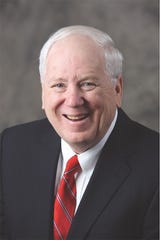Kenneth Quinn, former U.S. ambassador to Cambodia, will soon be the second person to be recognized by a British humanitarian organization working to prevent genocide.
Quinn, 76, now president of the World Food Prize Foundation in Des Moines, is receiving the prestigious award in recognition of his significant contributions to ending the Cambodian genocide.
The Steven Krulis Champion of Humanity Distinguished Service Award isnamed after a Holocaust survivor and was last awarded in 2002. It’s presented by the Aegis Trust, which was founded at the turn of the century to help prevent genocide and promote global humanity.
Quinn, who was born in the Bronx, New York, and attended high school in Dubuque, said he learned compassionwhile growing up in Iowa.
“When you confront human being who are suffering, even though the color of their skin, the language they speak, the God that they worship and the culture they’re from are totally different from mine, from ours, because they’re human beings I feel that I should do something to help alleviate their suffering, protect them and to bring them aid,” Quinn said.
Before becoming president of the World Food Prize Foundation, he spent 32 years as a diplomat for the State Department. He worked in Vietnam, with the United Nations in Australia and for Henry Kissinger’s National Security Council in Washington, D.C.
Quinn is widely recognized as the first person to write about the atrocities of the Khmer Rouge, a violent extremist regime in Cambodia, while he served as a rural development adviser in Vietnam.
Quinn called the 40-page report he wrote in the mid-1970s “prophetic,” though the humanitarian crisis didn’t begin to gain national attention until a year after his report was published.

Ambassador Kenneth Quinn (Photo11: Special to the Register)
In the late 1970s, Quinn found himself back in Iowa working for Gov. Robert Ray. While on a trip to Asia as part of a U.S. delegation, Quinn and the governor came across thousands of Cambodian refugees fleeing into Thailand.
They were emaciated, their suffering comparable to “the seventh level of Dante’s Inferno,” Quinn said.
He knew he had to do something to confront the widespread suffering, so he helped establish the Iowa Shares program in 1979, which used money raised by Iowans to bring food and medicine to Cambodian refugees.
Though Quinn’s career took him around the world, he found himself traveling to Cambodia a third time to serve as the U.S. ambassador.
He realized, thanks to his Midwestern roots, that agricultural enhancements, when paired with improved roads, can greatly improve a country’s stability.
Quinn used this strategy in the late 1990s to help eradicate the final few thousand Khmer Rouge still hiding out in Cambodia. And the roads helped bring hundreds of thousands of refugees home.
More: 50 years ago, my Iowa values led me to stop a torture event in Vietnam
“It is truly remarkable to have someone who played such a leading role in responding to the humanitarian fallout of genocide, in this case, the genocide in Cambodia,” said James Smith, chief executive officer of the trust.
“And yet before that, he raised the alarm some two years prior to the genocide starting, although this fell on deaf ears. And then, some years later, when he was United States Ambassador to Cambodia, he developed an ingenious way to eradicate the remnants of the perpetrators of this mass murder.”
Quinn said people often questioned his decision to take a job in Iowa, saying it would hurt his career. He went anyway.
“What if I hadn’t?” he asked, reflecting like a proud papa on the generosity of Iowans during the Iowa Shares program.
“When people are suffering, your obligation goes beyond people who is in your school, part of your church, part of your community, part of your state, part of your county,” Quinn said.
He recalled vividly a night during his service in Vietnam. A young enemy soldier had been shot and brought to them, but the nearest hospital was 15 miles away, down a dangerous road.
As Quinn began to walk away from a task deemed too risky, he stopped. The wailing mother holding the dying boy reminded him of the Pieta, a sculpture by Michelangelo depicting the Virgin Mary holding Jesus in her arms after his crucifixion.
He turned around and decided to make the journey to the hospital anyway.
“My Iowa values … didn’t allow me to turn my back when people are suffering,” he said.
Those same values led him to many awards, including U.S. Department’s Award for Heroism and Valor, the only civilian recipient of the U.S. Army Air Medal and the Iowa Award, the state’s highest honor.
Quinn plans to receive the award on March 5 at the House of Lords in London after spending a day in Rwanda at a memorial for its genocide victims and a day at the U.K. National Holocaust Museum in England.
